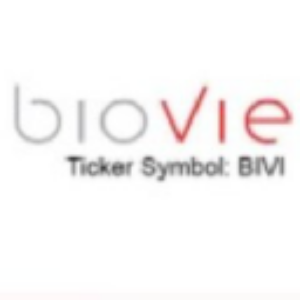BioVie to Present Overview of Phase 2 SUNRISE-PD Trial at the Advanced Therapeutics in Movement & Related Disorders® Congress
Rhea-AI Summary
BioVie (NASDAQ: BIVI) announced it will present a poster highlighting its Phase 2 SUNRISE-PD clinical trial at the Advanced Therapeutics in Movement & Related Disorders® Congress from June 27-30, 2025. The presentation will focus on the trial's decentralized design and patient experience in evaluating bezisterim (NE3107) for early Parkinson's disease treatment.
The Phase 2b SUNRISE-PD trial is a multicenter, randomized, double-blind, placebo-controlled study with a hybrid decentralized design lasting 20 weeks. Patients can participate either from home or at clinical sites, with home visits conducted by study nurses and remote neurologist supervision. The trial includes a modified MDS-UPDRS Part III examination, with successful participants potentially eligible for a longer-term, open-label safety study.
Positive
- None.
Negative
- None.
News Market Reaction
On the day this news was published, BIVI declined 3.74%, reflecting a moderate negative market reaction.
Data tracked by StockTitan Argus on the day of publication.
CARSON CITY, Nev., June 24, 2025 (GLOBE NEWSWIRE) -- BioVie Inc., (NASDAQ: BIVI) (“BioVie” or the “Company”) a clinical-stage company developing innovative drug therapies for the treatment of neurological and neurodegenerative disorders and advanced liver disease, today announced that a poster highlighting the decentralized design and patient experience of its Phase 2 SUNRISE-PD clinical trial evaluating bezisterim (NE3107) in early Parkinson’s disease will be presented in poster session at the upcoming Advanced Therapeutics in Movement & Related Disorders® Congress, to be held at National Harbor, MD, from June 27 to June 30, 2025.
Details for the poster session are as follows:
Title: SUNRISE-PD: An Ongoing, Hybrid, Decentralized Phase 2 Study of Bezisterim (NE3107) in Early Parkinson’s Disease
Poster session: 11:30am to 12:30pm, Friday June 27
Authors: Mark Stacy; Clarence Ahlem; Christopher L. Reading; Jeffrey Zhang; Joseph M. Palumbo
Poster position: P 49
Poster displayed from 7:00am Friday June 27 through 2:00pm Sunday June 29
SUNRISE-PD is a Phase 2b, multicenter, randomized, double-blind, placebo-controlled trial with a hybrid decentralized design that will last 20 weeks from the initial screening phase to the safety follow up.
As part of the trial, patients may participate either completely from their home or at a clinical site. At-home participants will be visited by study nurses who will complete study assessments with the assistance of a neurologist who will attend the visit remotely by video and supervise administration of a modified MDS-UPDRS Part III examination, which will be recorded for review and scoring by a central rating committee. If the trial's results are positive, participants may be eligible to enter a longer-term, open-label safety study.
About Parkinson’s Disease
Parkinson’s disease (PD) is a progressive neurodegenerative disorder that primarily affects movement. It is characterized by the loss of dopamine-producing neurons in the substantia nigra, a region of the brain critical for motor control. Core symptoms include tremors, muscle rigidity, bradykinesia (slowness of movement), postural instability, and difficulties with speech.1-2 Non-motor symptoms, such as cognitive impairment, mood disorders, and autonomic dysfunction, also significantly impact patients' quality of life.3 In the early stages, symptoms are often mild and may include subtle tremors, slight movement difficulties, and changes in handwriting or facial expressions. As the disease progresses, motor symptoms become more pronounced, leading to difficulties with balance, speech, and daily activities, often requiring full-time care in later stages.4
Since the 1960s, when dopamine’s critical role in Parkinson’s disease was first identified, levodopa has remained the cornerstone of treatment, providing significant symptom relief by replenishing dopamine levels in the brain.5-6 However, long-term use is associated with complications such as motor fluctuations—where symptom control becomes less stable—and dyskinesia, involuntary movements that can become debilitating.7-9
Emerging research highlights the role of chronic inflammation and insulin resistance in the onset and progression of Parkinson’s disease. Neuroinflammation, driven by activated microglia and elevated levels of pro-inflammatory cytokines, contributes to oxidative stress and accelerates neuronal degeneration.10-12 Additionally, insulin resistance, which impairs the brain’s ability to regulate glucose metabolism, has been linked to increased neurodegeneration and worsening motor symptoms.13-14 These metabolic dysfunctions create a harmful cycle that exacerbates disease progression, underscoring the potential of anti-inflammatory and insulin-sensitizing therapies as new avenues for treatment.
About Bezisterim
Bezisterim (NE3107) is an orally bioavailable, blood-brain barrier (BBB)-permeable modulator of inflammation and insulin-sensitizer. In addition, it is not immunosuppressive and has a low risk of drug-drug interaction. By binding to ERK and selectively modulating NFκB activation and TNF-α production, BioVie believes that bezisterim may offer clinical improvements in several disease indications, including Alzheimer’s disease, Parkinson’s disease and long COVID.
In Parkinson’s disease, BioVie is currently enrolling patients in the Phase 2 SUNRISE-PD clinical trial evaluating the safety and efficacy of bezisterim on motor and non-motor symptoms in patients who have not been treated with carbidopa/levodopa, with topline data expected in late 2025 or early 2026. A previous Phase 2 study of bezisterim in Parkinson’s disease (NCT05083260) completed in 2022, and data presented at the AD/PD™ 2023 International Conference on Alzheimer’s and Parkinson’s Diseases and related neurological disorders in Gothenburg, Sweden in March 2023 showed significant improvements in “morning on” symptoms and clinically meaningful improvement in motor control in patients treated with a combination of bezisterim and levodopa versus patients treated with levodopa alone, and no drug-related adverse events.
In long COVID, bezisterim has the potential to reduce neurological symptoms including fatigue and cognitive dysfunction. Persistently circulating viral spike proteins are believed to trigger TLR-4 driven activation of NFκB and the subsequent expression of inflammatory cytokines (IL-6, TNF, IFNg). BioVIe’s Phase 2 ADDRESS-LC study, is a randomized (1:1), placebo-controlled, multicenter trial in approximately 200 patients to evaluate the safety, tolerability and potential efficacy of 3 months of treatment with bezisterim to reduce the neurocognitive symptoms associated with long COVID, including difficulty concentrating or remembering things (“brain fog”) and fatigue.
In Alzheimer’s disease, BioVie conducted and reported efficacy data on its Phase 3 randomized, double-blind, placebo-controlled, parallel-group, multicenter study to evaluate bezisterim in patients who have mild-to-moderate Alzheimer’s disease (NCT04669028) in 2023. Results of a Phase 2 investigator-initiated trial (NCT05227820) showing bezisterim-treated patients experienced improved cognition and biomarker levels were presented at the Clinical Trials on Alzheimer’s Disease (CTAD) annual conference in December 2022. An estimated six million Americans suffer from Alzheimer’s disease.
About BioVie Inc.
BioVie Inc. (NASDAQ: BIVI) is a clinical-stage company developing innovative drug therapies for the treatment of neurological and neurodegenerative disorders (Alzheimer’s disease, Parkinson’s disease and long COVID) and advanced liver disease. In neurodegenerative disease, the Company’s drug candidate bezisterim inhibits inflammatory activation of extracellular signal-regulated kinase and the transcription factor nuclear factor-κB, and the associated neuroinflammation and insulin resistance but not ERK and NFκB homeostatic functions (e.g., insulin signaling and neuron growth and survival). Both neuroinflammation and insulin resistance are drivers of AD and PD. Persistent systematic inflammation and neuroinflammation are key features in patients with neurological symptoms of long COVID. In liver disease, the Company’s Orphan drug candidate BIV201 (continuous infusion terlipressin), with FDA Fast Track status, is being evaluated and discussed with guidance received from the FDA regarding the design of Phase 3 clinical testing of BIV201 for the reduction of further decompensation in participants with liver cirrhosis and ascites. The active agent is approved in the U.S. and in about 40 countries for related complications of advanced liver cirrhosis. For more information, visit www.bioviepharma.com.
Forward-Looking Statements
This press release contains forward-looking statements, which may be identified by words such as "expect," "look forward to," "anticipate" "intend," "plan," "believe," "seek," "estimate," "will," "project" or words of similar meaning. Although BioVie Inc. believes such forward-looking statements are based on reasonable assumptions, it can give no assurance that its expectations will be attained. Actual results may vary materially from those expressed or implied by the statements herein due to the Company's ability to successfully raise sufficient capital on reasonable terms or at all, available cash on hand and contractual and statutory limitations that could impair our ability to pay future dividends, our ability to complete our pre-clinical or clinical studies and to obtain approval for our product candidates, our ability to successfully defend potential future litigation, changes in local or national economic conditions as well as various additional risks, many of which are now unknown and generally out of the Company's control, and which are detailed from time to time in reports filed by the Company with the SEC, including quarterly reports on Form 10-Q, reports on Form 8-K and annual reports on Form 10-K. BioVie Inc. does not undertake any duty to update any statements contained herein (including any forward-looking statements), except as required by law.
References
1 Cleveland Clinic. Parkinson’s Disease. Last reviewed: 2022 Apr 15.
2 Jankovic J. J Neurol Neurosurg Psychiatry. 2008;79(4):368-376.
3 Postuma RB, Berg D, Stern M, et al. Mov Disord. 2015;30(12):1591-1601.
4 Kalia LV and Lang AE. Lancet. 2015;386(9996):896-912.
5 Hornykiewicz O. Angew Chem Int Ed. 2002;41(17):2934-2941.
6 Olanow CW, Obeso JA and Stocchi F. Lancet Neurol. 2006;5(8):677-687.
7 Ahlskog JE and Muenter MD. Mov Disord. 2001;16(3):448-458.
8 Espay AJ, Morgante F, Merola A, et al. Ann Neurol. 2018;84(6):797-811.
9 Cilia R and Akpalu A. J Neural Transm. 2020;127(5):889-916.
10 Jurcau A, Andronie-Cioara FL, Nistor-Cseppento DC, et al. Int J Mol Sci. 2023;24:14582.
11 Pajares M, Rojo AI, Manda G, et al. Cells. 2020;9:1687.
12 Isik S, Kiyak BY, Akbayir R, et al. Cells. 2023;12:1012.
13 Zagare A, Hemedan A, Almeida C, et al. Mov Disord. 2025;40(1):67-76.
14 Ruiz-Pozo VA, Tamayo-Trujillo R, Cadena-Ullauri S, et al. Nutrients. 2023;15(16):3585.
For Investor Relations Inquiries:
Contact:
Chuck Padala
Managing Director
LifeSci Advisors, LLC
chuck@lifesciadvisors.com
For Media Inquires
Melyssa Weible
Managing Partner, Elixir Health Public Relations
Ph: +1 201-723-5705
mweible@elixirhealthpr.com








